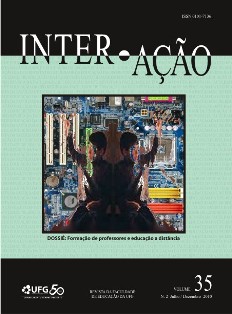TEACHER PERFORMANCE IN PEDAGOGICAL MEDIATION IN DISTANCE EDUCATION
DOI:
https://doi.org/10.5216/ia.v35i2.13128Keywords:
Educação a distância, Mediação pedagógicaAbstract
This article sets out to present the specifics of teacher performance in pedagogical mediation in distance education. A literature review of Bruno Latour’s propositions presents a conceptualization of pedagogical mediation, based on the discussion of epistemological principles in the mediator network theory. Samples of educational resources (teaching materials) and activities in Moodle are presented as results of action research thematized around teacher performance in preparing educational materials. It is noteworthy that pedagogical mediation in distance education requires teacher performance founded on basic principles (competence, autonomy and desire) which measures teacher production (authorship and co-authorship) as didactic, scientific, political and ethical dimensions of the teaching-learning process.Downloads
Downloads
Published
How to Cite
Issue
Section
License
Inter-Ação uses the Creative Commons Attribution 4.0 License for Open Access Journals (Open Archives Initiative - OAI) as the basis for the transfer of rights. Open access means making documents available on the Internet free of charge, so that users can read, download, copy, distribute, print, search, or link to the full text of documents, process them for indexing, use them as input data for software programs, or use them for any other lawful purpose, without financial, legal, or technical barriers.
Authors publishing in this journal agree to the following conditions:
1) Authors retain copyright and grant the journal the right of first publication, with the work simultaneously licensed under the Creative Commons Attribution License, which permits redistribution of the work with attribution and first publication in this journal.
2) Authors are permitted to enter into additional, separate agreements for non-exclusive distribution of the version of the work published in this journal (e.g., for publication in an institutional repository or as a book chapter), with attribution and first publication in this journal.
3) Authors are permitted and encouraged to publish and distribute their work online (e.g. in institutional repositories or on their home page) at any time before or during the editorial process, as this may generate productive changes as well as increase the impact and citation of the published work.















